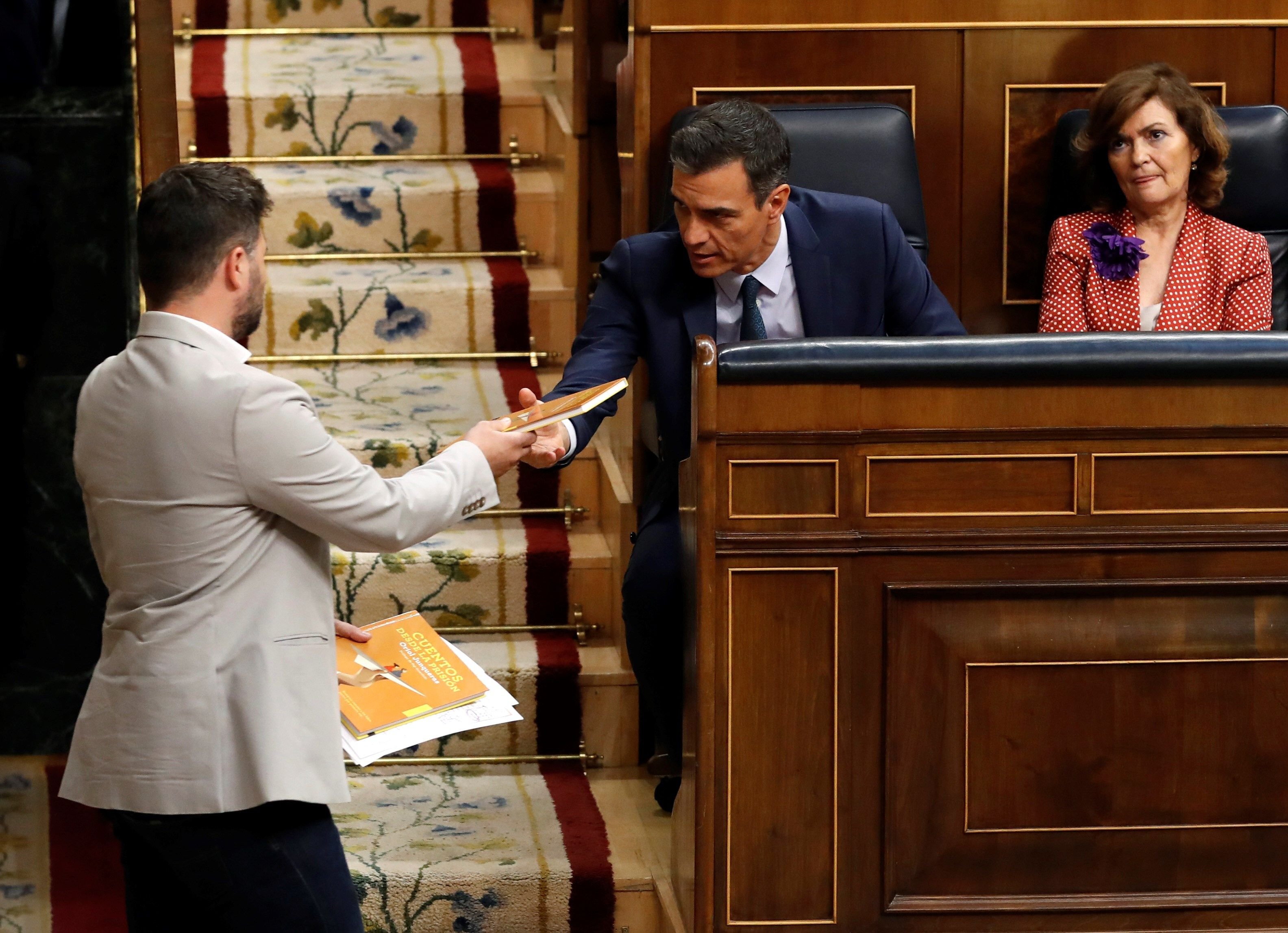During these last four long months, Pedro Sánchez has kept hammering away at one idea: "Spaniards voted for a progressive government that doesn't depend on the pro-independence forces." Unfortunately, no matter how much he repeated it, the results of the Spanish general election on 28th April said something else: that the votes of the pro-independence Catalan Republican Left (ERC), at the very least, were essential to be able to form a "progressive government." Even with the addition of all the seats won by Unidas Podemos, the Basque nationalists PNV, the Valencians Compromís and the Cantabria regionalists, the "progressive" total remained at 173, three less than a parliamentary majority. Not even with the two members of the Canary Coalition would there be enough. So in fact, what Spaniards voted for was a progressive government that does depend on the pro-independence forces. A reality that doesn't satisfy the Socialists, who feel in this situation that they have their hands tied. That is why they have now decided to go back to the polls, but they are also studying other ways of leaving the Catalan sovereignist forces without any influence. There is an elephant in the room and it is the pro-independence deputies in the Spanish Congress. Without them, the problem disappears. In the end, it is this that has been the cause of the blockage, despite the open-minded predisposition of ERC's Gabriel Rufián.
It is an old debate, but this Wednesday the Socialist party (PSOE) has reopened it. In an interview with the SER radio network this Tuesday, acting deputy prime minister Carmen Calvo defended the need for "modifications" to article 99 of the Spanish Constitution to avoid situations of blockage such as the current one. In fact, Pedro Sánchez himself proposed it in his investiture debate back in July. But today, Calvo went beyond the theoretical level, giving an example: the French and Portuguese two-round runoff systems, where there is a second vote between the two or three most-voted candidates. This could be an indirect way of leaving the Catalan independence groups out of play: it promotes a bipartisan system to the detriment of the smaller parties.
It is precisely in the bipartisan system, in the two major Spanish parties, PSOE and PP, where there is most consensus about the need to reform the system. Already in July, two days after the parliamentary elections in Greece won by the conservatives, Pablo Casado of the Popular Party put that country's model on the table. In Greece's elections, 250 of the 300 members of parliament are elected in open lists. The other 50 seats are a bonus, a prize for the most voted political force. In addition, according to Casado, making this change in Spain would not require constitutional reform, because the Constitution allows an increase from the current 350 to 400 seats in the Congress of Deputies - and that margin could be used to introduce this reward system.
This reform, however, does not generate a lot of sympathy in the circles of Unidas Podemos (UP) or Ciudadanos (Cs), who look distrustfully at how this would limit their influence. But Albert Rivera has his own specific solution to the problem of the pro-independence deputies: a threshold of 3% of the total vote across the Spanish state to prevent territorially-based parties from entering the Congress of Deputies (ERC did not even reach 2.7% on 28th April). "It cannot be by nature that parties like Bildu or ERC, which want to liquidate Spain, depend on the health, social security, education, and justice systems and all the accounts of the country," Rivera argued three months ago.
To all this, how do the Catalan independence groups respond? ERC say they are in favour of finding mechanisms to prevent institutional blockages "if it might avoid repeating the ridicule" experienced in this current Spanish legislature. However, they are well aware that this initiative could serve to strengthen bipartisanship and leave them out of play. "It is curious that no changes are proposed to try to channel the wishes of 80% of Catalans," was the ironic comment from ERC's Gabriel Rufián on Wednesday. The spokesman for the left-wing Comuns, Jaume Asens, also responded, saying that "what really needs to be changed are the forms in which people act."
In order to reform Article 99 of the Constitution, which regulates the investiture process, the consensus offered by a special majority, three-fifths of the two houses, that is, 210 deputies and 159 senators, is required. In any case, this hypothetical reform could not take place until after a second new election was held; with a first likely to be set in motion in just five days, when the Cortes will be dissolved and Spain will move to elections on 10th November.

